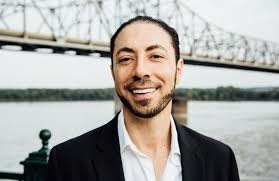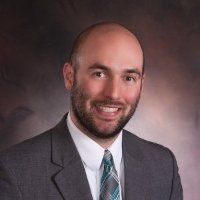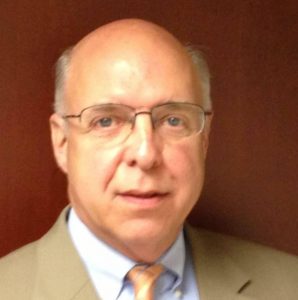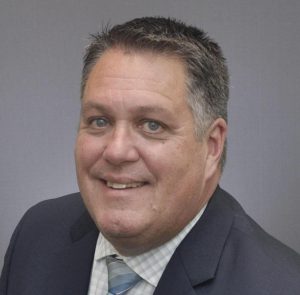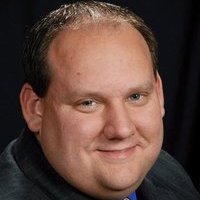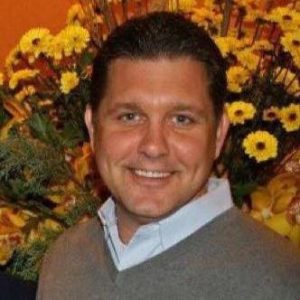Peoria candidates talk jobs and failing infrastructure before primary
By Holly Eitenmiller for Chronicle Media — February 27, 2017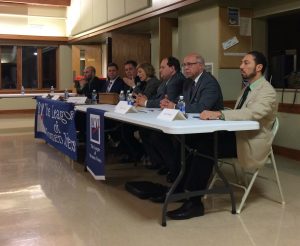
At-large candidates vying for Peoria City Council seats field voter questions Thursday evening. Of primary concern were issues of racism, business retention and slumping sales tax revenues. Left to right: Robert Hanauer, Sid Ruckriegel, Scott Kelsey, Zachary Oyler, John Kelly and Amr Elsamny. (Photo by Holly Eitenmiller for Chronicle Media)
Crumbling infrastructure, dwindling sales tax dollars, and the 61605 zip code were focal points at a Peoria City Council candidate forum Feb. 23.
Hosted by the League of Women Voters of Greater Peoria, more than 100 people gathered at the Universalist Unitarian Church in Peoria, to voice concerns about the socioeconomic issues beleaguering the city.
Moderator Tanya Koonce of Peoria Public Radio presented four audience-generated questions to six at-large city council candidates, who were given one minute each to respond. The candidates are vying for two unexpired two-year at-large council terms. The top four who emerge from the Feb. 28 primary election will advance to the April 4 general election.
The overall tone of the evening was one shared on a federal level; voters’ concerns were focused on racism, unemployment, urban decay and the opioid epidemic.
“Cities that are growing rapidly do not have these problems,” retired financial advisor John Kelly said in response to a question about the Don’t Shoot program, racism and the opioid epidemic.
Citing the 24/7 Wall Street study, in which Peoria ranked in the top 10 worst cities for black Americans, Kelly said Peoria’s growing problem with crime, drugs and racism are symptomatic of stagnation.
Egyptian immigrant and motivational speaker Amr Elsamny said he’s spent a considerable extent of time delving into these problems and recently met with Peoria County Sheriff Mike McCoy and Peoria Police Chief Jerry Mitchell in search of answers.
“I am passionate against racism and very concerned with the rise in heroin-related deaths,” Elsamny said. “We need jobs in the 61605 zip code.”
That zip code encompasses a swath of Peoria from William Kumpf Boulevard at the Peoria Civic Center to Interstate 474 and is home to the largest percentage of African Americans in Peoria. It suffers from severe infrastructure deterioration, as well as high crime and unemployment rates.
Attorney Rob Hanauer came forward as a strong advocate for programs that offer young people in low-income neighborhoods the opportunity to be proactive in their lives and in the community.
Zach Oyler, a Peoria real estate agent, insisted the city must invest in these deteriorating neighborhoods and become proactive in luring new businesses to these areas. “I know why people move to Peoria and I know why they move away,” he said.
Away would be the trend most feared, considering Caterpillar Inc.’s recent decision to relocated its headquarters from Peoria to Chicago, and voters are questioning the city council’s skills at wooing and retaining employers.
“We are not growing,” Kelly said, stating that growth policies are imperative to increasing property values, which, in turn, increase tax revenue. Kelly said Peoria’s climate is hostile to investment and higher wage employment.
But city government does not work well with prospective business owners, Oyler said. “Our leaders do not sit down and communicate with them. Look at what’s going on in East Peoria. East Peoria meets with business owners and works with them,” he said.
However, according to a survey conducted by the
Greater Peoria Economic Development Council, the region expects nearly 9,200 new job opportunities by 2019, many of which will be in manufacturing.
Scott Kelsy, who hails from a construction management background, said Peoria must implement training programs for residents of low-income areas that will enable them to land jobs in the construction, labor and manufacturing sectors.
The quality of Peoria’s labor force is a key component to enticing new business to settle in the area, appointed Peoria City Councilman Sid Ruckrieigel, said, adding that local government needs to work harder to build black business alliances.
The League of Women Voters of Greater Peoria is a nonpartisan community-based organization which seeks to educate voters on issues including elections, land use and housing.
The group encourages participation from women and men and boasts a membership that includes both genders.
Next, the group will host a Peoria Heights candidate forum on March 14, from 6:30 to 8 p.m., location to be announced. More information on LWVGP and its calendar of events may be found at www.http://www.peoria.il.lwvnet.org.
— Peoria candidates talk Jobs and failing infrastructure before primary —

